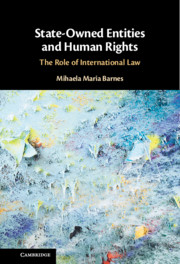Book contents
- State-Owned Entities and Human Rights
- State-Owned Entities and Human Rights
- Copyright page
- Dedication
- Contents
- Figures
- Foreword
- Acknowledgements
- Table of Cases
- Table of Treaties
- Table of Statutes and Statutory Instruments
- Abbreviations
- 1 Introduction to the Human Rights Dimension of State Corporate Ownership
- 2 State-Owned Entities as a Sui Generis ‘Participant’ in International Law
- 3 State-Owned Entities and Norm Development in International Law
- 4 Fundamental Change in International Law
- 5 The Continued Relevance of General International Law
- 6 Concluding Remarks
- Bibliography
- Index
4 - Fundamental Change in International Law
State Immunity and State-Owned Entities
Published online by Cambridge University Press: 25 November 2021
- State-Owned Entities and Human Rights
- State-Owned Entities and Human Rights
- Copyright page
- Dedication
- Contents
- Figures
- Foreword
- Acknowledgements
- Table of Cases
- Table of Treaties
- Table of Statutes and Statutory Instruments
- Abbreviations
- 1 Introduction to the Human Rights Dimension of State Corporate Ownership
- 2 State-Owned Entities as a Sui Generis ‘Participant’ in International Law
- 3 State-Owned Entities and Norm Development in International Law
- 4 Fundamental Change in International Law
- 5 The Continued Relevance of General International Law
- 6 Concluding Remarks
- Bibliography
- Index
Summary
Chapter four has a dual purpose: it firstly demonstrates how the increased participation of States in economic activities through their SOEs, has fundamentally changed international law; and secondly, it analyses some of the unique challenges posed by the doctrine of sovereign immunity to the regulation of SOEs. In this context, sovereign immunity is viewed as a unique challenge because if a SOE pleads immunity, a domestic court could be barred from either adjudicating the dispute in question, or from enforcing a judgment that has been obtained against a SOE. A plea of immunity could thus leave victims without a method to access justice, or without an effective remedy if the judgment that has been obtained cannot be enforced. With a focus on immunity from adjudication, the chapter looks into key issues such as the difference between acts jure imperii and acts jure gestionis, the process of assimilating SOEs into the State and some of the key exceptions to State immunity applicable to SOE such as the commercial transaction exception; the non-commercial tort exception and asks next whether there is a human rights exception to State immunity.
Keywords
- Type
- Chapter
- Information
- State-Owned Entities and Human RightsThe Role of International Law, pp. 152 - 201Publisher: Cambridge University PressPrint publication year: 2021



